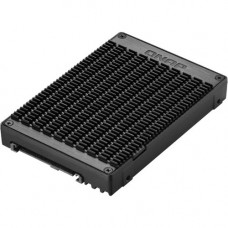Shopping Cart
0 item(s) - $0.00QNAP QDA-UMP Drive Enclosure for 2.5" M.2 - U.2 (SFF-8639) Host Interface Internal - 1 x SSD Supported - Aluminum Alloy - TAA Compliance QDA-UMP
The QDA-UMP can accommodate an M.2 PCIe 3.0 x4 NVMe SSD within a 2.5-inch U.2 (SFF-8639) PCIe 3.0 x4 NVMe SSD drive bay. No software driver is required for the QDA-UMP, and it can be installed in a PC/workstation (Windows®, Linux®) or QNAP NAS to replace an expensive U.2 SSD with a more-affordable M.2 SSD. Use an M.2 2280 (M key) PCIe NVMe SSD in a U.2 PCIe NVMe SSD drive bay (M.2 SSD sold separately). Up to PCIe 3.0 x4 file transfer speeds. High-quality construction for better heat dissipation The M.2 SSD thermal pads and aluminum-alloy metal frame assist in dissipating heat from the M.2 SSD to ensure high performance. Install in a PC/workstation for higher performance with lower costs Use the QDA-UMP to install a M.2 SSD in the 2.5-inch U.2 SSD tray of a high-end PC/workstation (Windows® or Linux®), and easily deal with tasks that require intensive data transmission (such as on-the-fly video editing, server-grade applications, or online gaming). Users can use utilities from their SSD manufacturer or third-party providers (for example: CrystalDiskInfo) to view the health status of the installed SSD. Maintain high performance with cost savings Use the QDA-UMP to replace U.2 NVMe SSD with M.2 NVMe SSD and maintain high-level performance. Install in QNAP NAS for efficient yet cost-effective storage Install one or more QDA-UMP in a NAS to maximize PCIe bandwidth utilization in a cost-effective way by using M.2 SSD instead of expensive U.2 SSD for optimizing data-intensive applications. It can also boost IOPS performance when configuring SSD caching. Users can monitor drive health and manage SSD usage from the QTS Storage & Snapshots Manager.











